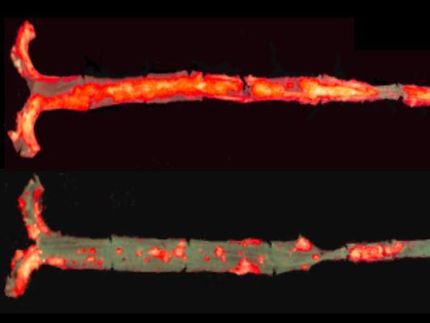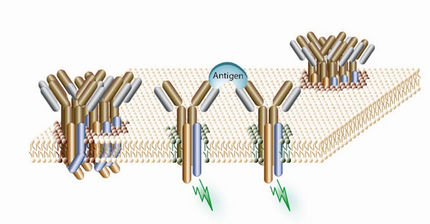Ingredient in red wine may prevent some blinding diseases
Resveratrol inhibits formation of damaging blood vessels in mouse retina
Resveratrol — found in red wine, grapes, blueberries, peanuts and other plants — stops out-of-control blood vessel growth in the eye, according to vision researchers at Washington University School of medicine in St. Louis. The discovery has implications for preserving vision in blinding eye diseases such as diabetic retinopathy and age-related macular degeneration.
The formation of new blood vessels, called angiogenesis, also plays a key role in certain cancers and in atherosclerosis. Conducting experiments in mouse retinas, the researchers found that resveratrol can inhibit angiogenesis. Another surprise was the pathway through which resveratrol blocked angiogenesis. The findings are reported in the July issue of the American Journal of Pathology.
"A great deal of research has identified resveratrol as an anti-aging compound, and given our interest in age-related eye disease, we wanted to find out whether there was a link," says Washington University retina specialist Rajendra S. Apte, MD, PhD, the study's senior investigator. "There were reports on resveratrol's effects on blood vessels in other parts of the body, but there was no evidence that it had any effects within the eye."
The investigators studied mice that develop abnormal blood vessels in the retina after laser treatment. Apte's team found that when the mice were given resveratrol, the abnormal blood vessels began to disappear.
Examining the blood-vessel cells in the laboratory, they identified a pathway — known as a eukaryotic elongation factor-2 kinase (eEF2) regulated pathway — that was responsible for the compound's protective effects. That was a surprise because past research involving resveratrol's anti-aging effects had implicated a different mechanism that these experiments showed not to be involved.
"We have identified a novel pathway that could become a new target for therapies," Apte says. "And we believe the pathway may be involved both in age-related eye disease and in other diseases where angiogenesis plays a destructive role."
Previous research into resveratrol's influence on aging and obesity had identified interactions between the red-wine compound and a group of proteins called sirtuins. Those proteins were not related to resveratrol's effects on abnormal blood vessel formation. Instead, the researchers say that in addition to investigating resveratrol as a potential therapy, they also want to look more closely at the eEF2 pathway to determine whether it might provide a new set of targets for therapies, both for eye disease and other problems related to abnormal angiogenesis.
Apte, an assistant professor of ophthalmology and visual sciences and of developmental biology, says because resveratrol is given orally, patients may prefer it to many current treatments for retinal disease, which involve eye injections. The compound also is easily absorbed in the body. In mice, resveratrol was effective both at preventing new blood vessels and at eliminating abnormal blood vessels that already had begun to develop.
Original publication: Khan AA, Dace DS, Ryazanov AG, Kelly J, Apte RS.; "Resveratrol regulates pathologic angiogenesis by a eukaryotic elongation factor-2 kinase-regulated pathway, American Journal of Pathology , vol. 177, 481-492, 2010.
Most read news
Topics
Organizations
Other news from the department science

Get the life science industry in your inbox
By submitting this form you agree that LUMITOS AG will send you the newsletter(s) selected above by email. Your data will not be passed on to third parties. Your data will be stored and processed in accordance with our data protection regulations. LUMITOS may contact you by email for the purpose of advertising or market and opinion surveys. You can revoke your consent at any time without giving reasons to LUMITOS AG, Ernst-Augustin-Str. 2, 12489 Berlin, Germany or by e-mail at revoke@lumitos.com with effect for the future. In addition, each email contains a link to unsubscribe from the corresponding newsletter.



















































